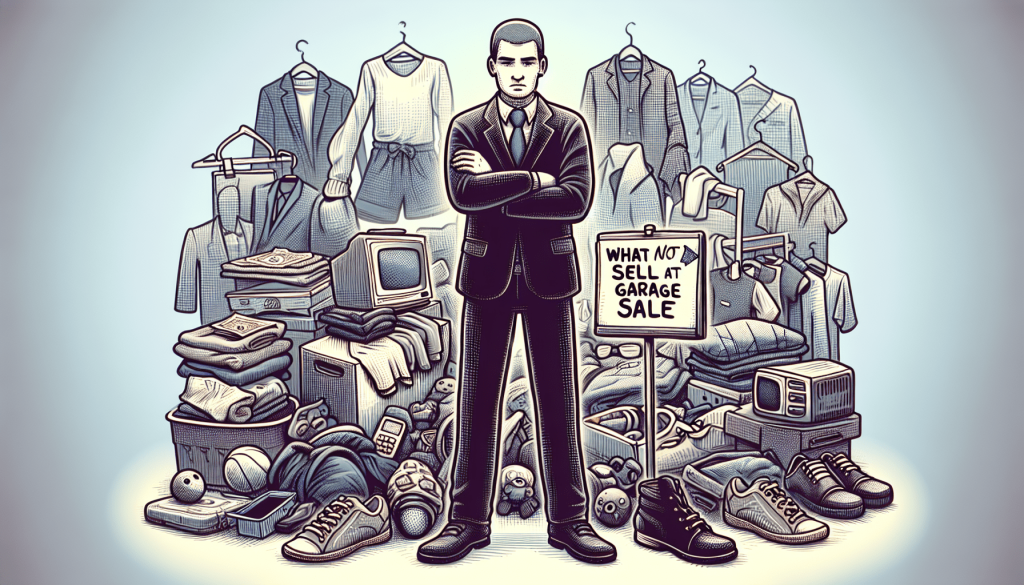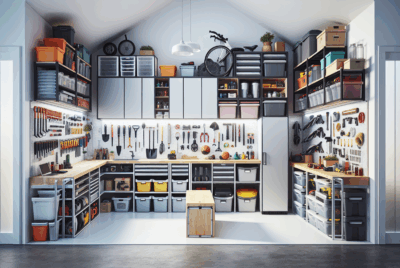What Not To Sell At Garage Sale
As an Amazon Associate, I earn from qualifying purchases, at no additional cost to you. Disclaimer
I’ve always loved the thrill of hosting a garage sale, but over the years, I’ve learned that not everything is meant to be sold. From personal experience, I’ve discovered a few items that are better left off the tables and out of the eager hands of bargain hunters. Whether it’s sentimental value, legal restrictions, or just plain common sense, there are certain things you’ll want to think twice about before putting them up for sale. In this article, I’ll share my insights on what not to sell at a garage sale, helping you make the most of your event while avoiding any potential pitfalls.
Recalled or Unsafe Items

Understand the recall policies and lists
When hosting a garage sale, it’s essential to have a thorough understanding of product safety and recall policies. Stay updated on the latest recalls by regularly checking the Consumer Product Safety Commission (CPSC) website or other reliable sources. Educate yourself about the specific products you plan to sell to ensure they haven’t been recalled due to safety concerns. By being proactive and informed, you can prevent the sale of potentially dangerous items.
Do not sell unsafe toys or equipment
As a responsible seller, it is crucial to prioritize the safety of your buyers. Avoid selling any toys or equipment that may pose a risk to children, such as those with small parts, sharp edges, or outdated safety features. Check for any signs of wear and tear, missing components, or safety recalls. By ensuring that the items you sell meet safety standards, you can protect both yourself and potential buyers from potential accidents or injuries.
Beware of selling items that have been in accidents
When selling items such as bicycles, car seats, or helmets, exercise caution if they have been involved in accidents. These items may have structural or functional damage that is not immediately visible. It is best to refrain from selling such items, as they may compromise the safety of the buyers. Instead, consider properly disposing of or recycling them, depending on local regulations.
Personal Documents
Accidental sale of personal information
While hosting a garage sale, it is essential to prioritize the protection of your personal information and that of others. Be mindful of items that might contain personal data, such as old cell phones, computers, or storage devices. Before selling these items, ensure that all personal information has been securely erased. Take the necessary steps to safeguard your privacy and that of the buyers.

Throwing away vs Selling
When it comes to personal documents, striking the right balance between decluttering and protecting your information is key. While throwing away unwanted documents may seem like a convenient option, it’s essential to consider proper disposal methods to prevent identity theft. Instead, selling personal documents like old books, magazines, or paperwork can be a safer choice. However, always ensure that no sensitive information remains before selling them.
Identity theft risks
Identity theft is a growing concern in our digital age. By selling personal documents without properly erasing personal information, you inadvertently expose yourself and others to potential identity theft risks. Safeguard both your own data and that of potential buyers by taking the necessary steps to delete or destroy any personal information stored in old documents or devices. By prioritizing privacy, you can create a safer environment for everyone involved.
Items with Sentimental Value
Regretting past sales
Parting ways with sentimental items can sometimes leave us with a sense of regret. While hosting a garage sale, it’s crucial to carefully consider the sentimental value of each item before deciding to sell it. Avoid selling items that hold deep emotional significance, as you may later regret the decision. Instead, focus on letting go of items that no longer hold sentimental value to you, ensuring a smoother transition and avoiding any potential emotional distress.
Understanding the value of sentiment
Sentimental value plays an essential role in our lives, connecting us to cherished memories and loved ones. Before selling sentimental items, take a moment to reflect on the emotional significance they hold. Consider whether the memories associated with the item outweigh the desire for additional space or financial gain. By understanding and appreciating the sentimental value, you can make more informed decisions about what to sell and what to keep.
Handling family heirlooms
Family heirlooms often carry deep historical and sentimental value, making them challenging to part with. When it comes to inherited or treasured items, carefully evaluate their significance before selling them. Consider alternative options, such as passing them down to the next generation or storing them in a safe place. By handling family heirlooms with care, you ensure their preservation for future generations and keep the sentimental connection alive.
Items in Poor Condition
Setting quality standards
Maintaining high-quality standards for the items you sell is vital to building trust with buyers and creating a positive garage sale experience. Before putting items up for sale, assess their condition honestly. Discard broken or damaged items that cannot be repaired or pose a safety risk. Setting quality standards will not only attract more buyers but also ensure that the items you sell are genuinely useful and functional.
Dealing with broken or damaged goods
While it might be tempting to try and sell broken or damaged items at a garage sale, it’s essential to be transparent and honest with potential buyers. Clearly label any items that are not in prime condition, disclosing any flaws or issues. Alternatively, consider offering these items for free or at heavily discounted prices, ensuring that buyers are aware of their condition upfront. This approach promotes goodwill and prevents any negative experiences for both parties involved.
Repercussions of selling poor quality items
Selling poor quality items can lead to dissatisfied buyers, negative reviews, or even legal implications. Strive to provide the best possible experience for your customers by only selling items in good condition. By maintaining integrity and ensuring the functionality of the items you sell, you build a positive reputation within the garage sale community. Moreover, selling quality goods enhances the overall success of your sale and encourages repeat customers.
Illegal Items

Understanding legal restrictions
As a responsible seller, it is crucial to familiarize yourself with the laws and regulations surrounding garage sales in your area. Some items may be prohibited or restricted for sale due to legal reasons. Research local laws to ensure compliance, and avoid selling anything that may be illegal. By being aware of legal restrictions, you avoid potential problems and maintain a positive relationship within your community.
Potential for legal repercussions
Selling illegal items can have severe consequences, including legal trouble, fines, or even criminal charges. Engaging in the sale of prohibited goods not only puts yourself at risk but also tarnishes your reputation in the community. Be diligent in examining the legality of the items you plan to sell, taking appropriate steps to remove any questionable goods from your inventory. Prioritizing legal compliance protects both you and your customers.
Handling questionable items
Occasionally, you may come across items that walk the line of legality. When in doubt about whether an item can be sold, consult local authorities or seek legal advice. Self-policing your inventory ensures that you maintain a lawful and ethical garage sale. By addressing questionable items proactively, you contribute to a safe and trustworthy marketplace for both sellers and buyers alike.
Hazardous or Harmful Material
Dealing with chemicals or dangerous goods
When considering selling items that contain hazardous materials, such as cleaning products or chemicals, exercise extreme caution. These items may pose serious health risks if not handled properly. Evaluate whether it is safe to sell such items at a garage sale, considering the potential danger to buyers and the environment. If unsure about safety, it is best to dispose of these hazardous materials responsibly, following local guidelines.

Potential harm to buyers
Exposing buyers to hazardous or harmful materials can result in severe health consequences, making it imperative to prioritize their safety. Clearly label any items that contain potentially dangerous substances and provide appropriate warnings. Consider providing safety information to buyers, ensuring they are aware of the proper handling procedures. It is crucial to act responsibly and protect the well-being of your customers.
Legal responsibility of selling harmful items
Selling items that could cause harm to others can also lead to legal consequences. As a seller, you have a duty of care to your customers, ensuring that they are not put at unnecessary risk. By selling harmful items, you may be held liable for any injuries or damages that occur as a result. Always err on the side of caution and avoid selling anything that could potentially cause harm. Taking legal responsibility seriously creates a safe and trustworthy selling environment.
Underwear and Bathing Suits
Hygiene concerns
Undergarments, such as underwear and bathing suits, are personal items that come into direct contact with the body. As a general rule, it is best to avoid selling used undergarments at a garage sale. These items carry a higher risk of hygiene concerns and transmit potential infections. Focus on selling new, unopened packages of undergarments, ensuring a clean and safe experience for buyers.
Handling secondhand intimates
While selling secondhand undergarments poses hygiene concerns, there may be exceptions for collectible items or vintage lingerie. In such cases, ensure the items are clean, in good condition, and properly sanitized before offering them for sale. However, it’s always advisable to exercise caution and check local regulations regarding the sale of secondhand undergarments.
Buyer expectations
Buyers have certain expectations when it comes to the hygiene and condition of undergarments and bathing suits. To maintain a positive experience, meet these expectations by offering new or gently used items that have been meticulously cleaned or properly labeled as unworn. Catering to buyer expectations demonstrates your commitment to their satisfaction and encourages repeat business.
Old Software and Computers
Potential for data leaks
Old software and computers may contain sensitive information, making them susceptible to data leaks if not handled properly. Ensure that all personal data is permanently deleted from any devices you plan to sell. Consider using data wiping software or consulting a professional to ensure complete and secure erasure. By taking these precautions, you protect your own privacy and that of potential buyers.
Handling outdated electronics
When it comes to old electronics, it’s essential to manage expectations by acknowledging their outdated nature. Clearly state the specifications and condition of electronic devices you plan to sell, ensuring that buyers have realistic expectations. Offering fair pricing for outdated technology encourages transparency and cultivates trust between buyers and sellers.
Dealing with e-waste responsibly
Electronic waste, or e-waste, is a growing environmental concern. Responsible disposal of old computers and electronics is vital to mitigate the impact on the environment. Consider contacting local recycling centers or electronic waste collection programs to properly dispose of any items that cannot be sold or repaired. By taking steps to handle e-waste responsibly, you contribute to a greener and more sustainable community.
Baby cribs and car seats
Changes in safety standards
Safety standards for baby cribs and car seats constantly evolve to ensure the well-being of children. When selling these items, it is essential to stay informed about the latest safety regulations. Check for any recalls or updates and ensure the items you plan to sell meet current safety standards. Always prioritize the safety of babies and young children above all else.
Risk of accidents
Baby cribs and car seats that are damaged, worn out, or outdated pose a significant risk to the safety of infants and toddlers. Avoid selling these items if they do not meet the current safety standards or if there are any concerns about their functionality. Properly dispose of or recycle these items according to local guidelines to prevent them from potentially causing harm.
Liability issues
Selling baby cribs and car seats that do not meet safety standards can lead to serious liability issues. In the event of an accident or injury, you may be held responsible for selling a faulty or dangerous product. Protect yourself and potential buyers by thoroughly inspecting these items and ensuring they meet the necessary safety requirements. By prioritizing safety and adhering to regulations, you prevent potential legal and financial repercussions.
Animal and Animal Products
Potential for disease transmission
Animal-related items, such as live animals, taxidermy, or certain animal products, carry the risk of disease transmission. Exercise caution when considering selling these items and be aware of any necessary permits or regulations. Consider the potential health risks associated with the item and consult with local authorities or experts to ensure compliance. Always prioritize the safety of both animals and potential buyers.
Ethical considerations
Animals have intrinsic value and deserve to be treated ethically and with respect. Selling live animals at a garage sale is generally not recommended, as it is essential to find suitable homes for them through ethical means. Ensure that any animal-related items you sell, such as fur coats or ivory products, comply with local laws and regulations. By acting ethically, you contribute to the welfare and protection of animals.
Legal restrictions and permits
Before selling animal-related items, it is crucial to be aware of any legal restrictions or permits required in your area. Some items, such as certain animal parts or endangered species products, may be illegal to sell without proper documentation. Conduct thorough research or consult local authorities to ensure compliance. By adhering to legal regulations, you protect yourself from potential legal consequences and contribute to the conservation of animal species.
In conclusion, when hosting a garage sale, it is important to prioritize safety, legality, and ethical considerations. By understanding the potential hazards associated with certain items and adhering to relevant regulations, you create a positive and trustworthy selling environment. Always put the well-being of your buyers and the community first to ensure a successful and enjoyable garage sale experience for everyone involved.





